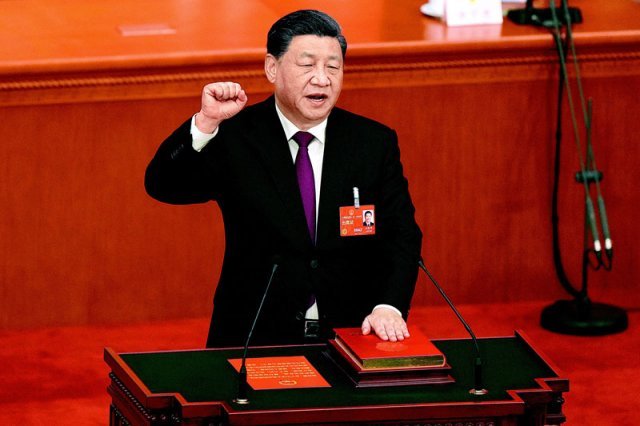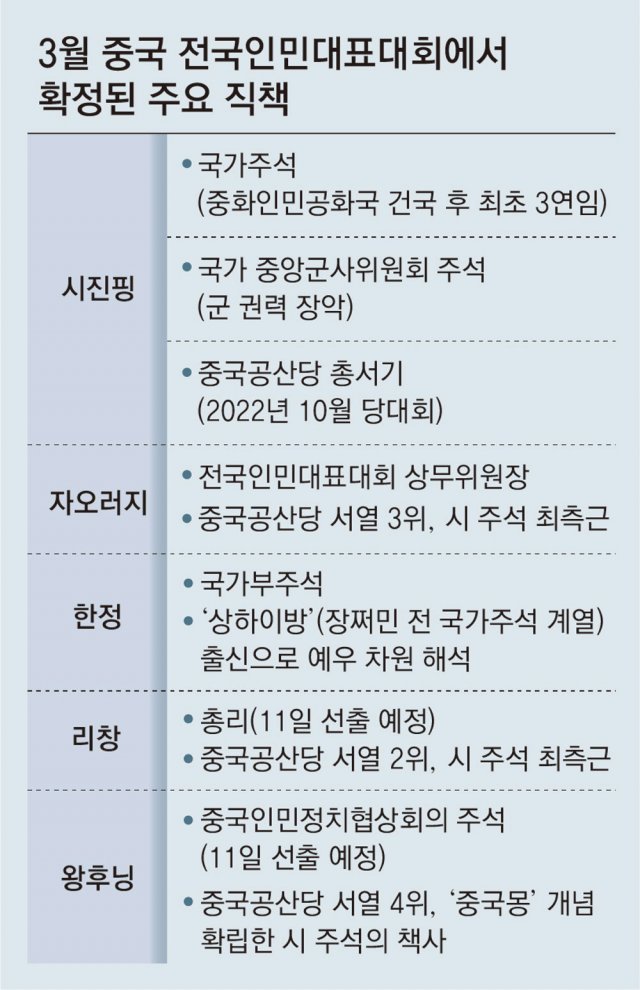For the first time in history, 3 consecutive terms… Party-military-government take over
Chinese President Xi Jinping (習近平, photo) was elected as the country’s president with the unanimous approval of 2,952 people who participated in the voting of the National People’s Congress (National People’s Congress and National Assembly) held at the Great Hall of the People in Beijing on the 10th. It was the first time since the founding of the People’s Republic of China in 1949 that Mao Zedong and Deng Xiaoping had succeeded in winning three consecutive terms as president.
Right after the announcement of the voting results that day, President Xi read an oath stating, “I will be loyal to the Constitution, uphold the authority of the Constitution, and fulfill the duties assigned by the law.” In October of last year, at the 20th National Congress of the Communist Party of China, he was elected general secretary of the party and chairman of the party’s Central Military Commission, effectively starting his third term in power. On this day, he was officially inaugurated as the president of the country through a national popular vote and a constitutional oath, and was guaranteed a tenure until March 2028. As a result, the ‘one-man ruling system’ in which President Xi took control of the party, military, and government was completed in name and reality.
On this day, Zhao Leji, a member of the Standing Committee of the Central Political Bureau of the Communist Party of China (CPC), was elected as the chairman of the Standing Committee of the National People’s Congress, which is equivalent to the chairman of the National Assembly. Deputy Prime Minister Han Jeong was elected as the vice-president of the country, a member of the former president Jiang Zemin.
[美中 갈등]
Party-government-military control One-person ruling system completed… The status of the ‘second-in-command’ prime minister seems to be further reduced
Zhao Leji, an aide to the National People’s Congress Standing Committee… Limited selection of ‘Shanghai Bang’ as Vice-President of State
 Oath of office ‘clasped fist’ Chinese President Xi Jinping takes the oath of office with his left hand on the constitution and his right hand clenched into a fist immediately after confirming his third consecutive term at the Great Hall of the People in Beijing on the 10th. He was the first to succeed in serving three consecutive terms since the founding of the People’s Republic of China in 1949, and is being evaluated as having completed a one-man ruling system that is true of name and reality. Beijing = AP Newsis
Oath of office ‘clasped fist’ Chinese President Xi Jinping takes the oath of office with his left hand on the constitution and his right hand clenched into a fist immediately after confirming his third consecutive term at the Great Hall of the People in Beijing on the 10th. He was the first to succeed in serving three consecutive terms since the founding of the People’s Republic of China in 1949, and is being evaluated as having completed a one-man ruling system that is true of name and reality. Beijing = AP NewsisChinese President Xi Jinping has become the first Chinese president since the founding of the People’s Republic of China in 1949 to succeed in a third consecutive term. Former Chairman Mao Zedong (毛澤東), who had been in power for life for 27 years, also held communist power until his death, but he did not retain his position as president of the state. As a result, there is an analysis that President Xi completed a ‘one-man dictatorship system’ in name and reality by holding all the powers of China’s party, government, and military, and evaluations are that he has effectively entered the path of lifelong rule.
At the 3rd plenary session of the 1st meeting of the 14th National People’s Congress (National People’s Congress and National Assembly) held at the Great Hall of the People in Beijing on the 10th, the point to watch for the president’s vote was ‘unanimous consent’. This vote was only a formal procedure as President Xi was named the first (first in rank) of the list of seven standing members at the 20th National Congress of the Communist Party of China (party congress) in October of last year and made it official for a third consecutive term. am.
As expected, Xi was unanimously elected as the country’s president, receiving votes from all 2,952 people who participated in the vote. There were no surprises in the election of the president of the National Military Commission that followed. In addition, votes to appoint the chairman of the National People’s Congress Standing Committee and the vice-president of the State were all unanimous. Previously, in the 2013 vote, when Xi first became the head of state, he received 99.86% of the vote, with 2,952 votes in favor, 1 vote against, and 3 abstentions. At the 2018 National People’s Congress, which confirmed his second consecutive term, 2,970 people were unanimously elected as the president of the country.
On this day, the National People’s Congress representatives were held in their seats in a way to indicate their opposition and abstention with a pen on the ballot paper. In the case of approval, there is no need to indicate otherwise. In other words, the moment you hold the pen and move it, opposition or abstention is clearly revealed, and unanimity is inevitable.
As President Xi walked to the podium to take the constitutional oath, which was the equivalent of an inauguration ceremony, right after the announcement of the voting results, President Xi’s advisor, Standing Committee member Wang Huning (王滬寧), stood and began to applaud. About 100 leaders applauded in unison. Immediately after confirming the second term five years ago, all the leadership was standing. This can be seen as a signal that the leadership competition for loyalty has begun in earnest.
President Xi strengthened his power at the party congress in October last year by being elected as the party’s general secretary and chairman of the party’s Central Military Commission, the pinnacle of Chinese power. He then became the highest leader across the party, state, and military by being elected three times in a row as the president of the state for a five-year term this time. It is possible to stay in power at least until 2028, when his term of office is guaranteed, and in the current situation where there is no clear successor, it seems possible to extend the power even after that. Like Mao Zedong, lifelong rule cannot be ruled out.
China’s second-in-command, the prime minister’s status, is expected to shrink significantly. On the 9th, Bloomberg News analyzed, “Li Chang, who has been nominated as prime minister, will be the prime minister with the weakest authority ever.” Bloomberg said, “Over the past 10 years, the ratio of mentions between President Xi and Premier Li Keqiang in the People’s Daily was 6:1. .
At the plenary session of the National People’s Congress that day, Zhao Leji, a member of the Standing Committee of the Central Committee of the Communist Party of China, was elected as the chairman of the National People’s Congress Standing Committee. Zhao Leji is the third-ranking figure in the Communist Party of China and is classified as one of Xi’s closest aides. Deputy Premier Han Jeong was elected as the vice-president of the country.
As President Xi’s ‘one-person ruling system’ is consolidated, there are observations that the competition for supremacy with the United States will become more intense. “A emboldened President Xi may decide that the time has come to realize China’s long-standing ambition to take control of Taiwan after escalating tensions across the Strait,” said AFP. I looked ahead.
Beijing =
Source: Donga
Mark Jones is a world traveler and journalist for News Rebeat. With a curious mind and a love of adventure, Mark brings a unique perspective to the latest global events and provides in-depth and thought-provoking coverage of the world at large.
